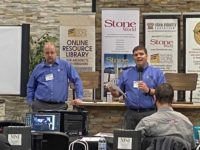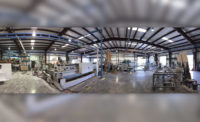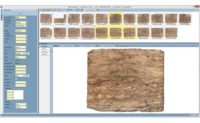Courtney and Oskar Gruber founded Chippewa Stone, in Medina, OH, in 2004, at first as a one-stop home remodeling business who outsourced their stonework. In 2008, they began cutting and fabricating stone themselves, eventually focusing solely on what they did best -- stone fabrication. Nearly a decade after Chippewa Stone started cutting their own slabs, Oskar and Courtney decided they had enough of the service they were putting up with for their bridge saw at the time.
“The previous company we purchased from was great -- right up until the machine was installed,” said Oskar Gruber. “After that, we never heard from them and getting service felt like we were being an inconvenience to them.”
In June of 2018, the Gruber’s invested in a Park Industries Yukon II bridge saw because Park Industries is also family owned and Made in America business. After the machine installation, Gruber was happy to receive a different experience this time around.
“Once Dale, our sales consultant from Park, sold us that saw, he continued talking to us and asking how he can help,” said the fabricator. “Even with things like the flow of the shop and finding ways to improve material handling efficiency. He had the sale and could’ve moved on, but he’s stayed committed with us as in an advisor role.”
Going digital
After numerous recommendations by Dale, Courtney, Oskar and their shop manager, Dan, went to Park’s Digital Stoneworking Expo in 2019, which was held in Chicago, IL. This opened up their eyes to the possibilities of going digital.
“It was a great event,” said Oskar Gruber. “I loved it. Seeing other shops and talking to other owners was a huge help with finding solutions to common problems in the industry.”
“There were shops who went digital producing numbers similar to ours in much smaller facilities,” said Courtney Gruber. “We have a pretty large facility, so I thought if they can fit in that machinery and excel, then we can do it too.”
Soon after, Chippewa Stone added a Saberjet XP and a Titan 3800. With the guidance of Park Industries and Dale, Chippewa Stone added a Saberjet XP CNC sawjet to take over their shop’s cutting production in June of 2020.
“This machine has given us the ability to take on commercial work,” said Oskar Gruber. “We cut eight bathroom vanities on the table and the Saberjet XP had it all done in under 45 minutes. That would have taken us all day prior to it. The waterjet is a game changer, and I love the way the machine runs.”
Soon after, Chippewa Stone was looking to add a boost to their polishing production. In December of 2020, they installed the Titan 3800. The quality of the polish, speed of the machine and freedom it gives their fabricators are the benefits they find most valuable.
“I prefer to run all my quartz on the Titan. You get a better polish,” said Oskar Gruber. “And being able to load up that large table with big islands or full jobs on the Titan, it’s getting them done faster and freeing up my guys to do other jobs. Everything is just getting done quicker and more efficiently since adding it.”
Chippewa Stone has established a great relationship with Jim Gahan of MFS (Manufacturing Finance Services). Fabricators choosing this form of capital equipment financing are able to use the machine as collateral, keeping credit lines open for other areas of business. Since it is still a conventional loan, they are able to reap huge tax advantages with section 179 of the tax code, and are able to write-off up to the full price of the machine.
The past year
Chippewa Stone has faced record sales over the last half year. The seven man shop produces more than 2,500 square feet of work each week. Courtney Gruber reflects on their decision to invest in machinery when they did. “It’s like everyone spent quarantine looking at their kitchens and saying, ‘I am done with this,’” she said. “Since things started to open up, we have been packed. I don’t think we would be able to keep up with the demand had we not made the decision to get the machinery when we did.”
Oskar Gruber continued, “We are very grateful for the numbers we’ve experienced, but there’s no way we would’ve been able to keep up. We would’ve had to been working nights, weekends -- pretty much all the time -- and it would’ve been unfair to put that much stress on the guys in the shop. To be able to produce that much more, without adding labor hours or pushing deadlines way out, is a testament to the efficiency of the machinery.”










